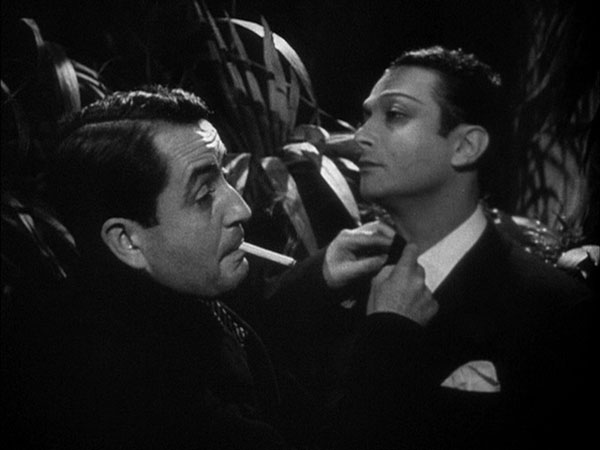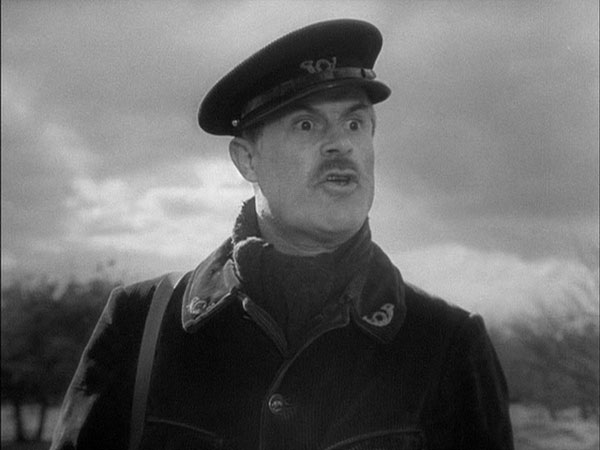Katy wanted to close out 1930’s Month with something Great, an acknowledged classic, something she is supposed to have seen but hasn’t, so I picked the one-time Greatest Film of All Time, Rules of the Game.
An amazing looking film indeed, with some fabulous, intricate staging. Some character, actor and plot notes before I forget them yet again:

from left to right:
1 Andre the pilot (Roland Tautain, played “the sailor” in Lang’s Liliom) just completed some impressively long news-making flight in order to impress Christine.
2 Octave (Jean Renoir, in his final role as a film actor. He wouldn’t make another film in France until The Golden Coach 14 years later). Friend to all, father figure and wannabe-lover to Christine, a short-lived fantasy. He turns darker (along with everything else) towards the end, realizing he’s a comic figure leeching off his rich friends, goes off to make a belated attempt to be self-sufficient.
3 Robert (Marcel Dalio, had appeared in Renoir’s Grand Illusion and would later have smallish parts in films by Hawks, Fuller (China Gate), Huston and Wyler), very rich but insecure, likes noisy mechanical inventions, has a gorgeous wife in Christine but also a long-standing affair (which he is trying to break off) with Genevieve (Mila Parély, would play one of Belle’s selfish sisters in Jean Cocteau’s Beauty and the Beast).
4 Austrian Christine (played by Austrian Nora Gregor, had been a star in the 20’s and 30’s, starring in Carl Dreyer’s Michael, killed herself ten years after Rules of the Game only having appeared in one movie since), a bit naive, thinks she belongs with Robert and that Andre is just a friend, until she catches Robert with Genevieve and it shakes her up.

Robert (right) with his “double”, Marceau the poacher (Julien Carette, my favorite actor in the group. He also appeared in the previous three Renoir films, later died from smoking in bed). Marceau wants respectability, gets hired by Robert as an indoor servant, but that doesn’t work out so well, goes off on his own at the end.

Christine again (left) with servant/friend Lisette (Paulette Dubost, was in Truffaut’s The Last Metro forty years later, also a couple by Max Ophuls in the 50’s), who is more devoted to Christine and her own position than she is to husband Edouard Schumacher (below). She’s Christine’s lower-class double, married to one man but wanting another.

Gaston Modot (Edouard) had been in films since 1909 and would keep it up till the 60’s, appearing in one of Renoir’s final films The Testament of Doctor Cordelier (and previously in Elena and Her Men, Grand Illusion and a couple others), also The Lovers and Children of Paradise. Even cooler, he played the main guy in L’Age d’Or. Edouard is jealous for his wife for good reason, since she’s happy to flirt with Marceau. He blasts through the house with his shotgun aiming for Marceau, later teams up with Marceau and aims for Octave, whom he suspects of hooking up with Lisette in the greenhouse. But due to costume changes he doesn’t realize it’s Andre with Christine in the greenhouse, and Edouard kills Andre.
–
Katy was disappointed, and disputes it being the greatest film of all time. Personally it’s only my third-favorite of the six Renoir films I’ve seen. I do love it, but I wonder about the best-film-ever label (recently surpassed by the new Batman on the all-time lists, actually), so let’s go to the DVD extras.
Ah, my old nemesis P.Bog reads the commentary, but it was written by Alexander Sesonske.
Renoir called it “a frivolous story” shot to avoid talking about the war… about “a rich, complex society where we are dancing on a volcano.”
Of André Jurieux’s radio speech in the opening scene: “His angry charge of disloyalty violates the rules of the game from the very start.”
Critics cried that Renoir cast an Austrian actress and a French jew to represent the French aristocracy.
“In a society of sharp class distinctions, Octave appears as a classless character.”
Plot shows two matched sets of husband/wife/lover/mistress and interceding friend:
1. Robert/Christine/Andre/Genevieve – Octave
2. Edouard/Lisette/Marceau/Christine(?) – and maybe Octave again.
Initially “The servants seem more sensitive to impropriety than their masters.”
“Those who know Renoir films may recognize a familiar figure, for Marceau is the incarnation of that nature god or pan figure who often graces those films from Tire-au-flanc in 1928 on. In a world where nothing is natural, it only appropriate that the nature god should appear as a little poacher in disguise and be pursued with deadly intent by a gamekeeper… But his influence remains the same. When he appears, erotic influences stir in human hearts. That these impulses are destructive rather than creative becomes one more Renoir comment on the corruption of this world.”